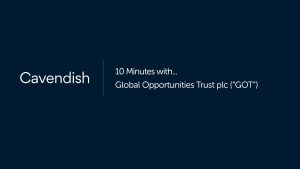Global Opportunities Trust plc (LON:GOT) invests globally in undervalued asset classes without reference to the composition of any stock market index.

Investment policy
The Company invests in a range of assets across both public and private markets throughout the world. These assets include both listed and unquoted securities, investments and interests in other investment companies and investment funds (including limited partnerships and offshore funds) as well as bonds (including index-linked securities) and cash as appropriate.
Any single investment in the Company’s portfolio may not exceed 15 per cent. of the Company’s total assets at the time of the relevant investment (the “Single Investment Limit”).
The Company may invest in other investment companies or funds and may appoint one or more sub-advisors to manage a portion of the portfolio if, in either case, the Board believes that doing so will provide access to specialist knowledge that is expected to enhance returns. The Company will gain exposure to private markets directly and indirectly through investment and interest in other investment companies and investment funds (including limited partnerships and offshore funds). The Company’s investment directly and indirectly in private markets (including through investment companies and investment funds) shall not, in aggregate, exceed 30 per cent. of the Company’s total assets, calculated at the time of the relevant investment.
The Company will invest no more than 15 per cent. of its total assets in other closed-ended listed investment companies (including investment trusts).
The Company may also invest up to 50 per cent. of its total assets in bonds, debt instruments, cash or cash equivalents when the Board believes extraordinary market or economic conditions make equity investment unattractive or while seeking appropriate investment opportunities for the portfolio or to maintain liquidity. The Single Investment Limit does not apply to cash or cash equivalents in such circumstances. In addition, the Company may purchase derivatives for the purposes of efficient portfolio management.
From time to time, when deemed appropriate and only where permitted in accordance with the UK Alternative Fund Managers Regulations 2013, the Company may borrow for investment purposes up to the equivalent of 25 per cent. of its total assets. By contrast, the Company’s portfolio may from time to time have substantial holdings of debt instruments, cash or short-term deposits.
The investment objective and policy are intended to ensure that the Company has the flexibility to seek out value across asset classes rather than being constrained by a relatively narrow investment objective. The objective and policy allow the Company to be constrained in its investment selection only by valuation and to be pragmatic in portfolio construction by only investing in assets which the Board considers to be undervalued on an absolute basis.
The value of the shares and any income derived from them can fall as well as rise, and investors may not get back the full value of their investment.

Investment Philosophy
The company believes a forward-looking and price-disciplined approach to investing that focuses on company fundamentals as the driver of value creation will generate superior returns for clients over the long term. The company calls this approach “compound value” to reflect the importance of combining these key elements into the assessment of all investment opportunities.
Deep fundamental business analysis is the core of the company’s investment process. The company never invests in a company until it has built its own proprietary financial model and takes the time to thoroughly understand how the companies under research operate. The company believes the price paid is critical to the long-term return and downside risk of the investment decisions made. However, the approach is forward-looking and prefers investing in growing companies. The common valuation metric used across all recommendations is a comparison of the current price of a stock with the company’s proprietary forecast of its fiscal year 6 earnings. This enables comparison of every company under research, regardless of country or industry, on a like-for-like basis. However, the company also recognises that a “one size fits all” approach to valuation has limitations, and the analysis is tailored to the specific “type of value” an individual company represents:
- Classic Value – companies where the past is a guide to the future
- Mispriced Growth – companies where the future will be better than the past
- Quality stocks – where a longer-term view is appropriate because the company is sufficiently robust or predictable
- Discounted Cash Flow – companies where cash generation will drive the share price
- Discounted Assets – where unlocking of asset value drives the investment thesis as the assets of the business may be underutilised or ignored
A discounted asset stock may not look particularly attractive from an earnings perspective, for example, but still be undervalued. Likewise, if a company is particularly resilient or is growing strongly, it can be appropriate to pay a little more than would be justified for a lower quality or slower growing company. The company believes the types of value framework adopted allows for a broad approach to valuation whilst also benefitting from a strict price discipline.
Stock recommendations from analysts are vetted by the relevant Director of Research at team meetings within a culture that encourages creative idea generation.
The company’s investment process fuses “bottom up” stock selection with the development of a deep understanding of what exposures an individual stock brings to portfolios. The company categorises stocks by type of value but also by a range of other “risk clusters” that form a bridge to the portfolio management process. Where the ideas embedded in a stock recommendation are relevant to a broader theme that could become a significant exposure in portfolios, the company may draw together resources from across the team to work in a coordinated manner and build conviction.
The company aims to build portfolios that are well diversified by country, industry, type of value and risk clusters. However, it is willing to back its conviction and portfolios tend to look very different to benchmark indices.
The value of the shares and any income derived from them can fall as well as rise, and investors may not get back the full value of their investment.
The portfolio is likely to be more concentrated than that of other similar companies, and share price and NAV are therefore likely to be more volatile than other more diversified portfolios.
Learn more at: https://globalopportunitiestrust.com/







